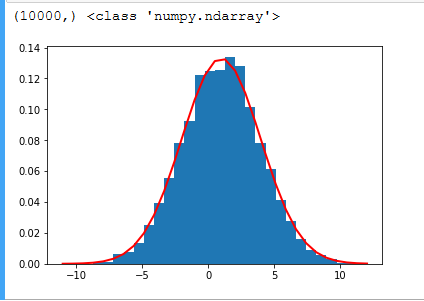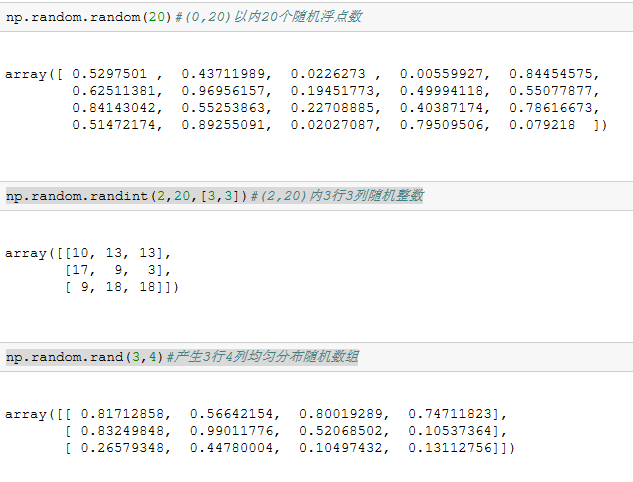numpy統計分佈
阿新 • • 發佈:2018-11-11
1.計算鳶尾花花瓣長度的最大值,平均值,中值,均方差。
#計算鳶尾花花瓣長度最大值 import numpy as np from sklearn.datasets import load_iris data = load_iris() type(data) print(data.keys(),data.feature_names) iris=data.data iris
執行結果:
2.用np.random.normal()產生一個正態分佈的隨機陣列,並顯示出來。
import numpy as np import matplotlib.pyplotas plt mu = 1 #期望為1 sigma = 3 #標準差為3 num = 10000 #個數為10000 rand_data = np.random.normal(mu, sigma, num) print(rand_data.shape,type(rand_data)) count, bins, ignored=plt.hist(rand_data, 30, normed=True) plt.plot(bins, 1/(sigma * np.sqrt(2 * np.pi)) *np.exp( - (bins - mu)**2 / (2 * sigma**2)), linewidth=2, color='r') plt.show()
執行結果:


3.np.random.randn()產生一個正態分佈的隨機陣列,並顯示出來。
np.random.randn(3,3)#3行3列正態分佈隨機陣列
執行結果:

4.顯示鳶尾花花瓣長度的正態分佈圖,曲線圖,散點圖。
import numpy as np import matplotlib.pyplot as plt x = np.linspace(0,50) y = x**2 plt.plot(x,y) plt.show()

petal_length mu = np.mean(petal_length) sigma = np.std(petal_length) print(np.mean(petal_length),np.std(petal_length),np.median(petal_length)) count, bins, ignored=plt.hist(rand_data, 30, normed=True) plt.plot(bins, 1/(sigma * np.sqrt(2 * np.pi)) *np.exp( - (bins - mu)**2 / (2 * sigma**2)), linewidth=2, color='r') plt.plot(np.linspace(0,150,num=150),petal_length,'r') plt.scatter(np.linspace(0,150,num=150),petal_length,alpha=0.5,marker='x') plt.show()
import numpy as np
import matplotlib.pyplot as plt
t = np.arange(0., 1., 0.02)
plt.plot(t,sin(t),'r--',t, t**3, 'b^', t, t**2, 'gs')
#plt.show()


